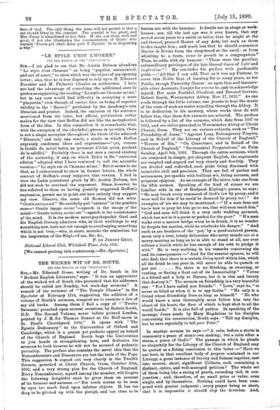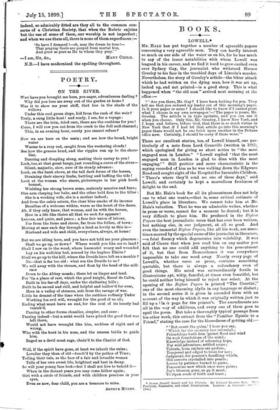THE WICKED WIT OF DR. SOUTH.
[To THE EDITOR OF THE " SPECTATOR.]
Sra,—Mr. Edmund Gosse, writing of Dr. South in his "Modern English Literature," says : "It was an appreciator of the wicked wit of South who protested that his addresses should be called not Sunday, but week-day sermons." A remark of the reviewer of "The Temple Classics" in the Spectator of February 11th, suggesting the addition of a volume of South's sermons, tempted me to examine a few of my old books. Among them I find a copy of " ' Twelve Sermons,' preached upon several occasions, by Robert South, D.D. The Second Volume, never before printed London, printed by J. H. for Thomas Bennet at the Half-moon in St. Paul's Churchyard 1694." It opens with "The Epistle Dedicatory" to the Universities of Oxford and Cambridge, which is a quaint yet pathetic appeal on behalf of the Church of England. South begs the Universities to join hands in strengthening hers, and dedicates his sermons to both because he will not be accused of pedantic partiality. The preface also contains the novel idea that the Nonconformists and Dissenters are but the tools of the Pope. This suggestion ?a argued out very clearly in the Twelfth Sermon, preached at Christ Church, Oxon, October 30th, 1692, and a very strong plea for the Church of England. Every Nonconformist, myself among the number, will forgive the following delightful snub he gives them on account of its humour and sarcasm :—" For truth scorns to be seen by eyes too much fixed upon inferior objects. It lies too deep to be pitched up with the plough, and too close to be
beaten out with the hammer. It dwells not in shops or work. houses ; nor, till the last age was it ever known, that any
served seven years to a smith or tailor, that he might at the end thereof, proceed Master of any Arts, but such as those trades taught him ; and much less that he should commence Doctor o'r Divine from the shop-board or the anvil: or from whistling to a team, come to preach to a congregation." Then, he adds, with sly humour : "These were the peculiar,
extraordinary privileges of the late blessed times of light and
insriration" ! He concludes his preface with pardonable pride :—" All that I can add, That as it was my Fortune to serve this Noble Seat of learning for so many years, as her Public, though Unworthy Orator : so upon that and innumer- able other Accounts, I ought for ever to be, and to acknowledge myself, Her most Faithful, Obedient, and Devoted Servant, Robert South, Westminster Abbey, Nov. 17, 1693." As one reads through the little volume, one yearns to hear the music of the voice of such an orator sounding through the Abbey. It is in dedication to his memory, whose works thus do still follow him, that these few extracts are selected. The preface
is followed by a list of the sermons, which date from 1667 to 1692, and are either preached at 'Westminster Abbey or Christ Church, Oxon. They are on various subjects, such as "The Friendship of Jesus," "Against Long Extemporary Prayers, and in Behalf of the Liturgy of the Church of England," "Terrors of Sin," "On Conscience, and in Behalf of the Church of England," "Sacramental Preparations," on Palm Sunday, April 8th, 1688. Through the entire sermons, which are composed in simple, yet eloquent English, the arguments are weighed and argued out very clearly and forcibly. They are divided and redivided, each point being discussed with inimitable skill and precision. They are full of pathos and seriousness, yet sparkle with brilliant wit, biting sarcasm, and poignant epigram. As an example of the latter, take one from the fifth sermon. Speaking of the kind of sinner we are familiar with in one of Rudyard Kipling's poems, he says: "He may break every command of God's law by proxy, and it were well for him if he could be damned by proxy too!" As examples of his wit may be mentioned :—" If a man does not knOw how to pray let him go to sea, that will soon teach him." "God and man will think it a very unfit wedding garment, which has not in it a purse or pocket for the poor." "If a man walks over a narrow bridge when he is drunk, it is no wonder he forgets his caution, while he overlooks his danger." "And such as are brothers of the 'pot,' by a good-natured person, mean only a true, trusty debauchee who never stands out at a merry-meeting so long as he is able to stand at all, nor ever refuses a health while he has enough of his own to pledge it with." He is very scathing in his remarks concerning sin and its consequences :—"And for the sensual epicure, he will also find, that there is a certain living spark within him, which all the drink he can pour in, will never be able to quench or put out No, there is no drinking, or swearing, or ranting, or fluxing a Soul out of its Immortality." "Virtue is a friend and a help to Nature, but it is vice and luxury that destroy it." The sermon on friendship is a very beautiful one : "For I have called you friends." "Love," says he, "is never so blind as when it is to spy faults." "He only is a friend whose friendship lives as long as himself." "He who w-ould know a man thoroughly must follow him into the closet of his heart, the door of which is kept shut to all the world beside." It is also full of pathos. In speaking of the message Jesus sends by Mary Magdalene to his disciples concerning his resurrection, South says : "Tell my disciples, but be sure especially to tell poor Peter."
In another sermon he says —"A calm before a storm is commonly a peace of man's own making; but a calm after a storm, a peace of God's." The passage in which he pleads so eloquehtly for the Liturgy of the Church of England may be quoted as a fitting conclusion to this letter :—" Have we not here, in that excellent body of prayers contained in our Liturgy, a great instance of brevity and fulness together, cast into several, short, significant Collects, each containing a, distinct, entire, and well-managed petition ? The whole set of them being like a string of pearls, exceeding rich in con- junction ; and, therefore, of no small price or value, even single, and by themselves. Nothing could have been cam. posed with greater judgment ; every prayer being so short, that it is impossible it should cloy the devotion. And,
indeed, so admirably fitted are they all to the common con- cerns of a Christian Society, that when the Rubric enjoins but the use of some of them, our worship is not imperfect ; and when we use them all, there is none of them superfluous :-
So have I dreamed I—oh, may the dream be true 1— That praying Souls are purged from mortal hue, And grow as pure as He to whom they pray."
N.B.—I have modernised the spelling throughout.







































 Previous page
Previous page